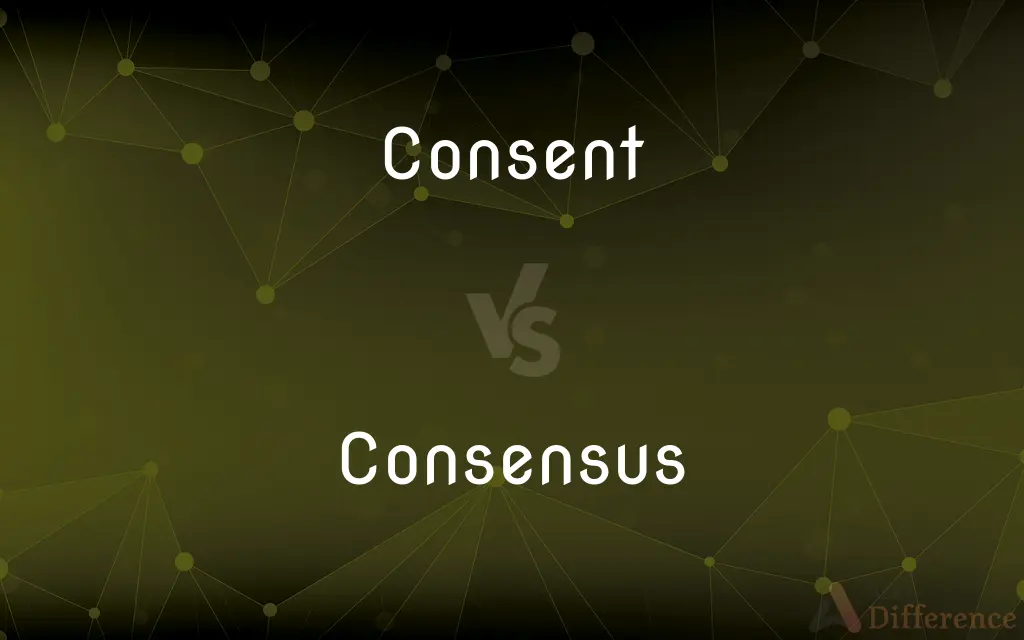Consent vs. Consensus — What's the Difference?
By Maham Liaqat & Urooj Arif — Updated on April 4, 2024
Consent is an agreement or permission given by an individual, while consensus is a general agreement among a group.

Difference Between Consent and Consensus
Table of Contents
ADVERTISEMENT
Key Differences
Consent and consensus are two fundamental concepts in decision-making processes, each playing a crucial role in different contexts. Consent is the explicit permission given by an individual for something to happen or an agreement to do something. It emphasizes individual autonomy and the right to make decisions about one's own life and body. In contrast, consensus refers to a collective agreement reached by a group where all members support or can live with the decision, even if it may not be their first choice. It underscores the importance of collaborative decision-making and unity within a group.
While consent is about individual approval, consensus focuses on collective harmony and agreement. For example, in a healthcare setting, a patient's consent is required before undergoing a procedure, highlighting the respect for individual rights and choices. Meanwhile, consensus is often sought in collaborative environments like workplaces or community organizations, where the goal is to make decisions that reflect the collective will and minimize dissent.
The process of reaching consent and consensus also differs. Consent requires clear communication and understanding between the parties involved, ensuring that the individual fully understands and agrees to the terms or actions proposed. On the other hand, reaching consensus may involve discussion, negotiation, and compromise among group members to arrive at a decision that is acceptable to all, demonstrating the value placed on group cohesion and shared responsibility.
In some contexts, both consent and consensus may be necessary. For instance, in a democratic society, policies or laws may be enacted based on the consensus of elected representatives, but their implementation on an individual level—such as participation in certain programs—may require personal consent. This highlights how both concepts can intersect to ensure that decisions are made both democratically and with respect for individual autonomy.
Understanding the difference between consent and consensus is crucial for navigating social, professional, and personal interactions. While consent prioritizes individual rights and agreement, consensus aims for collective agreement and unity within a group, reflecting different dimensions of respect and decision-making in society.
ADVERTISEMENT
Comparison Chart
Definition
Individual agreement or permission
Collective agreement among a group
Focus
Individual autonomy
Group harmony and unity
Context
Personal decisions, healthcare, legal agreements
Collaborative environments, group decision-making
Process
Obtaining explicit permission from an individual
Discussion, negotiation, and compromise to achieve group agreement
Importance
Respects individual rights and choices
Ensures decisions reflect collective will and minimize dissent
Compare with Definitions
Consent
Permission for something to happen or agreement to do something.
The patient gave her consent for the surgery after understanding the risks.
Consensus
General agreement or unity of opinion among a group.
After a lengthy discussion, the committee reached a consensus on the new policy.
Consent
An individual’s explicit approval of an action or proposal.
He signed a document indicating his consent to participate in the study.
Consensus
In collaborative environments, a way to build team cohesion.
Achieving consensus on project goals strengthened the team's bond.
Consent
A legal concept indicating voluntary agreement.
The contract is valid only with the consent of both parties.
Consensus
A decision-making process where all members support the decision.
The community reached consensus on the development plan, ensuring all voices were heard.
Consent
In personal relationships, agreeing to engage in specific activities.
True consent in any relationship requires open communication and respect.
Consensus
A democratic principle in collective decision-making.
The group operates on the principle of consensus, valuing every member's input.
Consent
A foundational principle in ethical standards.
Informed consent is a cornerstone of research ethics.
Consensus
The absence of strong opposition in a group, allowing progress.
Although not everyone was entirely satisfied, there was enough consensus to move forward.
Consent
Permission for something to happen or agreement to do something
No change may be made without the consent of all the partners
Consensus
An opinion or position reached by a group as a whole
"Among political women ... there is a clear consensus about the problems women candidates have traditionally faced" (Wendy Kaminer). See Usage Note at redundancy.
Consent
Give permission for something to happen
He consented to a search by a detective
Consensus
General agreement or accord
Government by consensus.
Consent
To give assent, as to the proposal of another; agree
Consent to medical treatment.
Consent to going on a business trip.
Consent to see someone on short notice.
Consensus
A process of decision-making that seeks widespread agreement among group members.
Consent
(Archaic) To be of the same mind or opinion.
Consensus
General agreement among the members of a given group or community, each of which exercises some discretion in decision-making and follow-up action.
After years of debate over the best wine to serve at Thanksgiving, no real consensus has emerged.
Consent
Acceptance or approval of what is planned or done by another; acquiescence.
Consensus
(computing) An agreement on some data value that is needed during computation.
Consent
Agreement as to opinion or a course of action
She was chosen by common consent to speak for the group.
Consensus
(attributive) Average projected value.
A financial consensus forecast
Consent
(intransitive) To express willingness, to give permission.
After reflecting a little bit, I've decided to consent.
Consensus
(ambitransitive) To seek consensus; to hold discussions with the aim of reaching mutual agreement.
Consent
To cause to sign a consent form.
Consensus
Agreement; accord; consent.
That traditional consensus of society which we call public opinion.
Consent
To grant; to allow; to assent to.
Consensus
Agreement in the judgment or opinion reached by a group as a whole;
The lack of consensus reflected differences in theoretical positions
Those rights and obligations are based on an unstated consensus
Consent
To agree in opinion or sentiment; to be of the same mind; to accord; to concur.
Consent
Voluntary agreement or permission.
Consent
(obsolete) Unity or agreement of opinion, sentiment, or inclination.
Consent
(obsolete) Advice; counsel.
Consent
To agree in opinion or sentiment; to be of the same mind; to accord; to concur.
And Saul was consenting unto his death.
Flourishing many years before Wyclif, and much consenting with him in jugdment.
Consent
To indicate or express a willingness; to yield to guidance, persuasion, or necessity; to give assent or approval; to comply.
My poverty, but not my will, consents.
And whispering "I will ne'er consent," - consented.
Consent
To grant; to allow; to assent to; to admit.
Interpreters . . . will not consent it to be a true story.
Consent
Agreement in opinion or sentiment; the being of one mind; accord.
All with one consent began to make excuse.
They fell together all, as by consent.
Consent
Correspondence in parts, qualities, or operations; agreement; harmony; coherence.
The melodious consent of the birds.
Such is the world's great harmony that springsFrom union, order, full consent of things.
Consent
Voluntary accordance with, or concurrence in, what is done or proposed by another; acquiescence; compliance; approval; permission.
Thou wert possessed of David's throneBy free consent of all.
Consent
Capable, deliberate, and voluntary assent or agreement to, or concurrence in, some act or purpose, implying physical and mental power and free action.
Consent
Sympathy. See Sympathy, 4.
Consent
Permission to do something;
He indicated his consent
Consent
Give an affirmative reply to; respond favorably to;
I cannot accept your invitation
I go for this resolution
Common Curiosities
Can consent be withdrawn?
Yes, consent can be withdrawn at any time, emphasizing the importance of ongoing and voluntary agreement.
Can an individual dissent in a consensus?
Yes, individuals might not fully agree but can still support the consensus if they believe it benefits the group as a whole.
Can a decision be both consensual and consensual?
Yes, in contexts where group decisions must also respect individual rights, both consensus among the group and consent from individuals involved are necessary.
How is consensus reached in large groups?
Through dialogue, negotiation, and sometimes voting to find a solution that is acceptable to the majority, if not all.
Is consent required in all decision-making processes?
Consent is crucial in any context where individual autonomy and choice are concerned, especially in personal and legal matters.
What happens if consensus cannot be reached?
Alternatives include further discussion, mediation, or resorting to voting, though this may not reflect the ideal of consensus decision-making.
How does consensus benefit a community?
It ensures decisions are made with broad support, fostering unity and reducing conflict within the community.
Is consent always verbal?
Consent can be verbal or written, but it must be explicitly communicated and understood by all parties involved.
Why is consent important in relationships?
It ensures that all actions and interactions are mutually agreed upon, respecting personal boundaries and autonomy.
How do cultural values influence consensus?
Cultural values can shape the process and importance placed on consensus, influencing how groups negotiate and prioritize collective agreement.
Can consensus lead to better decision outcomes?
Yes, because it involves collective input and negotiation, which can result in more comprehensive and accepted solutions.
Is written consent more valid than verbal?
Both are valid, but written consent provides a tangible record, which can be crucial in legal and formal contexts.
How is consensus different from majority rule?
Consensus aims for full group agreement, whereas majority rule follows the decision of the majority, possibly overlooking minority opinions.
How do organizations ensure consent is informed?
By providing all necessary information in a clear and understandable manner, allowing for questions, and ensuring the individual comprehends the implications.
Share Your Discovery

Previous Comparison
Deva vs. Devi
Next Comparison
Decapod vs. IsopodAuthor Spotlight
Written by
Maham LiaqatCo-written by
Urooj ArifUrooj is a skilled content writer at Ask Difference, known for her exceptional ability to simplify complex topics into engaging and informative content. With a passion for research and a flair for clear, concise writing, she consistently delivers articles that resonate with our diverse audience.















































